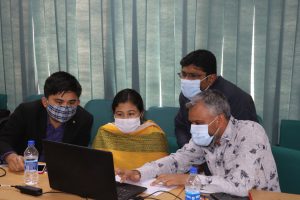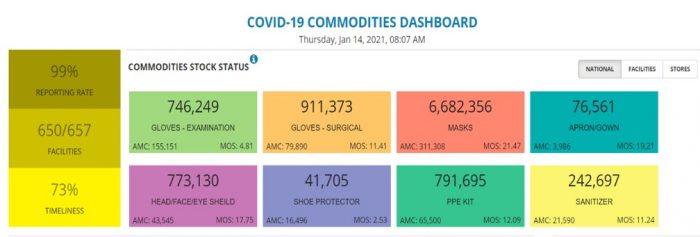Digitalization of COVID-19 Commodities Supply Management Strengthens Health Delivery in Bangladesh
Even without the stress of a pandemic, the health supply chain management is a challenge for Bangladesh’s Directorate General of Health Services (DGHS), given its lack of an integrated inventory management system and no tracking and reporting in place of the inventory by pharmacies and storekeepers. When the first case of COVID-19 was reported in the country on March 8, 2020, the situation became a crisis as the DGHS, under the Ministry of Health and Family Welfare, had to monitor and ensure an adequate supply of emergency commodities at all the health facilities across the nation.
USAID MTaPS built off an existing electronic logistics information management system (eLIMS) that was implemented by a predecessor USAID program for select maternal, newborn, and child health products to develop a comprehensive COVID-19 eLMIS, which successfully helped the DGHS overcome the crisis.
Establishing a Centralized COVID-19 Commodities Management System
At the onset, MTaPS developed a basic online reporting system and virtually oriented roughly 500 health workers to quickly enable a centralized mechanism for daily tracking of stock status of emergency commodities at health facilities and distribution centers. By April, the DGHS and central administration, suppliers, and beneficiaries were receiving daily updates on the stock status of emergency commodities across the country, with 99% of COVID-19-dedicated health facilities reporting daily.
As the outbreak spread and the need for an expanded inventory management system for proper management of COVID-19 commodities became clearer, MTaPS, in collaboration with the DGHS, proceeded to upgrade the reporting system into a comprehensive COVID-19 eLMIS with a quantification tool to make stock information available in real-time, critical to aid decisions at the central level for timely procurement and distribution. A phased roll-out of the eLMIS began after user acceptance testing and rapid assessment of facilities’ readiness.
Nationwide Roll-Out and Country Ownership
The COVID-19 eLMIS is built upon the Ministry of Health and Family Welfare’s Supply Chain Management Portal at https://scmpbd.org/. In December 2020, MTaPS started batch-wise training of three users each at 94 health facilities to kickstart a nationwide rollout and handover to the Management Information Systems (MIS) unit of the DGHS. With the active engagement of the MIS unit in the design and training process and the director of MIS charged with ownership of the system, the COVID-19 eLMIS is set to be fully operationalized and monitored by the MIS unit.

Training on eLMIS as part of national roll-out of the emergency commodities management system
“The COVID eLMIS and Quantification tool is very helpful for the users for their day-to-day store management activities. Also, this tool provides real-time stock status of the facilities for decision-making. We plan to enhance and upgrade the system with the technical assistance from USAID MTaPS program to cover all commodities under DGHS.” – Professor Dr. Mijanur Rahman, Director – Management Information System, Directorate General of Health Services
Avoiding Stockouts During COVID-19 and Looking Beyond
The roll-out of the eLMIS equips DGHS for timely decision-making on procurement, restocking, and rational distribution of COVID-19 commodities. The system, which tracks information, including stock status, inventory transactions, donations, and consumption, allows tailored reports accessible by all stakeholders, including policymakers and suppliers. It has also become a go-to resource for donors, such as UNICEF and USAID, to track the distribution and status of their products.
Most importantly, the eLMIS has demonstrated the critical role of a centralized inventory management system to inform procurement and distribution and avoid stockouts for uninterrupted healthcare delivery. With the success of COVID-19 eLMIS, the DGHS plans to expand the system’s functionality to cover all medical commodities under the directorate – a transformative step for Bangladesh’s health system that will not only promote transparency and efficient use of resources but also encourage further integration of the supply chain.
